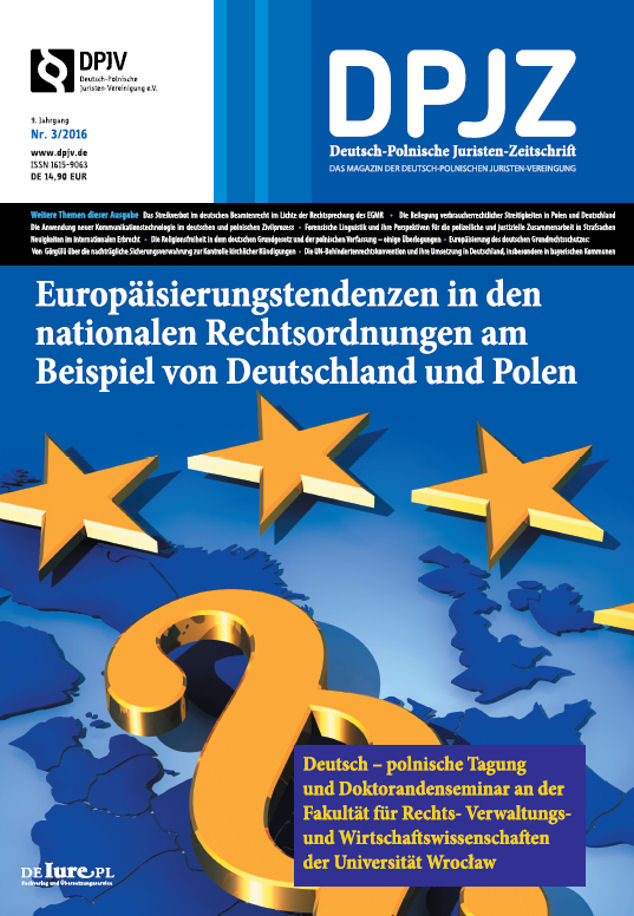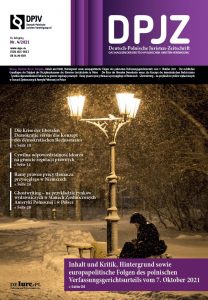Inhaltsverzeichnis:
- „Das Streikverbot im deutschen Beamtenrecht im Lichte der Rechtsprechung des EGMR“ von Gerrit Manssen,
- „Die Beilegung verbracherrechtlicher Streitigkeiten in Polen und Deutschland“ von Anna Banaszewska,
- „Foresische Linguistik und ihre Perspektiven für die polizeiliche und justizielle Zusammenarbeit in Strafsachen“ von Ewelina Sznajderska,
- „Neuigkeiten im internationalen Erbrecht“ von Mateusz Popielas,
- „Die Religionsfreiheit in dem deutschen Grundgesetz und der polnischen Verfassung“ von Olga Hałub,
- „Europäisierung des deutschen Grundrechtsschutzes – von Gürgülu über die nachträgliche Sicherungsverwahrung zur Kontrolle kirchlicher Kündigungen“ von Robert Uerpmann-Wittzack,
- „Die UN-Behindertenrechtskonvention und ihre Umsetzung in Deutschland. insbesondere in bayerischen Kommunen“ von Ursula Obermayr,
Streszczenia / Summaries
Prof. Dr. Gerrit Manssen, Universität Regensburg
Der Verfasser ist seit 1997 Inhaber des Lehrstuhls für Öffentliches Recht, insbesondere Verwaltungsrecht an der Fakultät für Rechtswissenschaft der Universität Regensburg. Gerrit.Manssen@jura.uni-regensburg.de.
Das Streikverbot im deutschen Beamtenrecht im Lichte der Rechtsprechung des EGMR
Zusammenfassung: Nach weitgehend einhelliger Auffassung in der deutschen Rechtsprechung und Literatur dürfen Beamte, also Personen, die in einem besonderen öffentlich-rechtlichen Dienst- und Treueverhältnis stehen, nicht streiken. Nach zwei Entscheidungen des Europäischen Gerichtshofs für Menschenrechte zum Recht der Türkei wachsen allerdings auch in Deutschland die Zweifel, ob hieran noch länger festgehalten werden kann. Der folgende Beitrag zeigt auf, dass letztlich eine Fortentwicklung des deutschen Beamtenrechts nötig ist, um den Vorgaben der Europäischen Menschenrechtskonvention Genüge zu tun.
Stichwörter: Beamte, Öffentlicher Dienst, Streikverbot, EMRK.
Summary: It is almost generally acknowledged in German jurisdiction and academic literature that civil servants, viz. individuals who maintain a particular relationship of service and loyalty to the State, are not allowed to strike. In the aftermath of two decisions of the European Court of Human Rights concerning the Turkish legal system, doubts have arisen as to whether the traditional German approach can be adhered to in future. In what follows it will be shown that, ultimately, an advancement of the German civil service law is needed in order to meet the requirements of the European Convention on Human Rights.
Key words: civil servants, public service, ban on strikes, ECHR.
Anna Banaszewska
Doktorandin am Lehrstuhl für Zivilprozessrecht, Universität in Breslau, anna.banaszewska@uwr.edu.pl
Die Beilegung verbraucherrechtlicher Streitigkeiten in Polen und Deutschland
Summary: One of the main goals of the European Union is achieving a high level of consumer protection. In order to meet this aim the enforcement of consumers‘ claims must be quick and cost-effective. Although there are many possibilities to assert consumers‘ rights, in many cases they abandon their claims. The article presents a general overview on methods of consumer disputes resolution in Poland and Germany. In both countries consumers may pursue their claims either by bringing an action before competent court or by using alternative dispute resolution schemes. The article discusses Polish and German civil procedures as well as bodies responsible for out-of court settlement of consumer disputes. The article sets out not only national provisions but also European directives and regulations, focusing on new European regulatory framework for extra-judicial consumer redress – Regulation on consumer ODR and Directive on consumer ADR.
Key words: access to justice, alternative dispute resolution, arbitration, civil procedure, consumer protection, European order for payment, mediation, online dispute resolution, small claims procedure.
Stichwörter: Zugang zur Justiz, ADR, Schlichtung, Zivilprozessrecht, Verbraucherschutz, Mediation, europäischer Zahlungsbefehl, ODR, europäisches Verfahren für geringfügige Forderungen.
Ewelina Sznajderska
Ewelina Sznajderska – Doktorandin am Lehrstuhl für Kriminalistik, Universität Wrocław; Rechtspflegerin am Amtsgericht für Wrocław – Fabryczna in Wrocław; E-Mail: ewelinna@poczta.onet.pl.
Forensische Linguistik und ihre Perspektiven für die polizeiliche und justizielle Zusammenarbeit in Strafsachen
Summary: The article addresses the topic of forensic linguistics as a discipline as well as it covers an application thereof, particularly in relation to an on going Europeanization of national legal systems of the European Union Member States. It highlights the impact of European integration in the field of combating and preventing crime. The article suggests that there is an increasing need for establishing international groups which would enhance police and judicial cooperation in criminal matters, with a special regard to the fight against cross-border crime. Joint investigation teams were proposed as a solution and subjected to analysis.
Key words: forensic linguistics, joint investigation teams, cross-border crime, European law.
Mateusz Popielas
Doktorand, Institut für Zivilrecht, Fakultät für Rechts–, Verwaltungs– und Wirtschaftswissenschaften, Universität Wroclaw, mateusz.popielas@gmail.com.
Neuigkeiten im internationalen Erbrecht
Summary: Regulation 650/2012 of the European Parliament and of the Council of 4.07.2012 on jurisdiction, applicable law, recognition and enforcement of decisions and acceptance and enforcement of authentic instruments in matters of succession and on the creation of a European Certificate of Succession harmonizes the rules on the jurisdiction and applicable law governing matters of succession in the EU, as well as the recognition and enforcement of decisions, and acceptance and enforcement of authentic instruments in such matters. It also introduces a European Certificate of Succession, to be used by heirs, legatees and executors of wills or administrators of the estate to invoke their status or to exercise their rights in another EU country. This Regulation shall apply to the succession of persons who die on or after the 17.09.2015. Choices of law and dispositions of property upon death made prior to that date are valid under specific conditions laid down in the Regulation.
Olga Hałub
Doktorantka w Katedrze Prawa Konstytucyjnego na Wydziale Prawa, Administracji i Ekonomii, Uniwersytet Wrocławski, olga.halub@prawo.uni.wroc.pl.
Die Religionsfreiheit in dem deutschen Grundgesetz und der polnischen Verfassung – einige Überlegungen
Zusammenfassung: Zusammenfassend kann man feststellen, dass die polnischen und deutschen Gerichte versuchen, allen Gesellschaftsbedürfnissen entgegenzukommen. Das Beispiel der Religionsfreiheit zeigt, dass es noch andere Umstände bei der gerichtlichen Entscheidung eine Rolle spielen. Nämlich: kulturelle und historische Entwicklung, Tradition und nationale Identität. Ohne das wären die Richter nur „der Mund des Gesetzes“. Die nationalen Rechtsprechungen werden meines Erachtens immer häufiger der Rechtsprechung des Europäischen Gerichtshofes für Menschenrechte folgen, der eine strenge Trennung zwischen Religion und Staat verordnet. Für die multikulturellen Gesellschaften Europas soll das eine optimale Lösung sein.
Stichwörter: die Religionsfreiheit, positive Religionsfreiheit, negative Religionsfreiheit, die Grenzen der Religionsfreiheit.
Summary: Freedom of religion is recognized as one of the most fundamental human rights in present democratic countries. In this paper it will be presented synthetic analysis of regulation corresponding to title freedom in Polish and German legal system, especially at the constitutional level (Constitution of the Republic of Poland of 2 April 1997 and Basic Law for the Federal Republic of Germany of 23 Mai 1949). The issue of the borders of religious freedom will be discussed in the context of the doctrine and chosen judgments of the Polish and German courts.
Keywords: freedom of religion, positive freedom of religion, negative freedom of religion, borders of freedom of religion.
Prof. Dr. Robert Uerpmann-Wittzack, maître en droit (Aix-Marseille III)
Inhaber des Lehrstuhls für Öffentliches Recht und Völkerrecht an der Universität Regensburg. ro-bert.uerpmann-wittzack@ur.de.
Europäisierung des deutschen Grundrechtsschutzes:
Von Görgülü über die nachträgliche Sicherungsverwahrung zur Kontrolle kirchlicher Kündigungen
Zusammenfassung: Nationale Gerichte sind verpflichtet, die Rechtsprechung des EGMR bei ihren Entscheidungen zu berücksichtigen, und sie brauchen sehr gute Gründe, um von einer EGMR-Entscheidung abzuweichen. Die Rechtsprechung des EGMR ist damit ähnlich bedeutend wie die Rechtsprechung nationaler Höchstgerichte. Die Berücksichtigungspflicht führt aber nicht zu einer schematischen Bindung an Straßburger case law. Nationale Gerichte müssen die notwendigen Freiräume behalten, um gemeinsam mit dem EGMR nach der jeweils besten Lösung zu suchen.
Ob deutsche Beamte in Zukunft streiken dürfen, wird der Dialog zwischen Deutschland und Straßburg zeigen. Dabei sind gewisse Konfrontationen in einem lebendigen Dialog nicht ausgeschlossen. Es spricht aber alles dafür, dass die Umsetzung Straßburger Vorgaben auch hier nicht am „letzten Wort“ des Bundesverfassungsgerichts scheitern wird. Eher steht zu erwarten, dass das Bundesverfassungsgericht der EGMR-Rechtsprechung mit seinem letzten Wort zum Durchbruch verhilft, wie es schon im Fall Görgülü und bei der nachträglichen Sicherungsverwahrung der Fall war.
Stichwörter: nationale Gerichte, Grundrechtschutz, Europäisierung
Summary: Since 2004, the German Federal Constitutional Court (FCC) has rendered two landmark decisions on the domestic judicial implementation of European Court of Human Rights (ECtHR) case law. The article analyses the landmark decisions in Görgülü and Retrospective Preventive Detention as well a recent judgment on ecclesiastical labour law. The FCC recognises the primordial role of the ECtHR in shaping common European human rights standards, and it is willing to implement them. At the same time, however, the FCC seeks to preserve the autonomy of the German legal system. In fact, in a multilayer system, autonomous but coordinate legal orders are the very basis for a fruitful dialogue between the ECtHR and domestic courts.
Key words: national courts, protection of fundamental rights, Europeanisation.
von Ursula Obermayr
Doktorandin und wissenschaftliche Mitarbeiterin bei Prof. Dr. Gerrit Manssen am Lehrstuhl für Öffentliches Recht, insbesondere deutsches und europäisches Verwaltungsrecht an der Universität Regensburg sowie nebenberuflich Lehrbeauftragte für Rehabilitationsrecht an der OTH Regensburg. ursula.obermayr(at)jura.uni-regensburg.de,
Die UN-Behindertenrechtskonvention und ihre Umsetzung in Deutschland, insbesondere in bayerischen Kommunen
Zusammenfassung: Die UN-Behindertenrechtskonvention (UN-BRK) beschreibt erstmals die anerkannten Menschenrechte aus der Perspektive behinderter Menschen. Sie enthält die Forderung, „die volle Verwirklichung aller Menschenrechte und Grundfreiheiten für alle Menschen mit Behinderungen ohne jede Diskriminierung aufgrund von Behinderung zu gewährleisten und zu fördern“. Obwohl feststeht, dass die UN-BRK in Deutschland im Rang eines einfachen Gesetzes steht, ist nicht hinreichend geklärt, wie sie zur Geltung gelangt und wie die Umsetzung auf jeder staatlichen Ebene sichergestellt werden kann. Ebenfalls ungeklärt sind u.a. die Fragen, wie und von welcher staatlichen Ebene die UN-BRK umgesetzt werden muss, wer hierfür die Kosten zu tragen hat, insbesondere, ob ein Fall der Konnexität i. S. v. Art. 83 BV vorliegt. Ebenso ist zu untersuchen, inwiefern kommunale Aktionspläne ein geeignetes Umsetzungsinstrument für den Art. 19 Buchst. c) UN-BRK sind, inwieweit hierfür rechtliche Vorgaben erforderlich sind, und wie diese konkret auszugestalten sind.
Stichwörter: Behinderte Menschen, Selbstbestimmt Leben, UN-Behindertenrechtskonvention, Art. 19 Buchst. c) UN-BRK, Menschenrechte, Grundfreiheiten, Diskriminierungsverbot, Geltung in Deutschland, Umsetzung, staatliche Ebene, Kommune, Kostentragung, Konnexität, kommunaler Aktionsplan, neue Aufgaben, Rechtsgrundlage.
Summary: The Convention of the United Nations on the Rights of Persons with Disabilities describes for the first time human rights from the point of view of disabled people. Following the Convention, States Parties undertake to ensure and promote the full realization of all human rights and fundamental freedoms for all persons with disabilities without discrimination of any kind on the basis of disability. Although the Convention ranks as statutory law in Germany, it is not clear how it will be made a reality and how this process will have to be controlled and ensured at each level of the state structure. It will be necessary to consider which level is called upon to implement the Convention and which will have to bear the costs of its implementation. The latter issue is of particular interest in Bavaria where the Land is obliged to allocate funds to local authorities in case they have been assigned novel tasks. Further questions will be whether an action plan is an appropriate means of implementation, to which extent such plans need to be regulated by law and how they should be framed in detail.
Key-Words: Persons with Disabilities, Independent Living, Convention of the United Nations on the Rights of Persons with Disabilities, human rights, fundamental freedoms, non-discrimination, implementation, level of state structure, costs, obligation to allocate funds, novel tasks, action plan, regulation.



